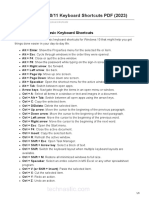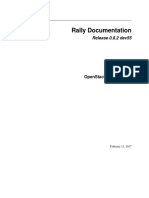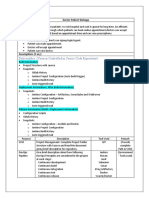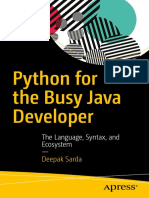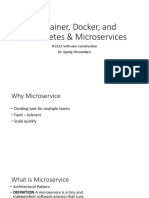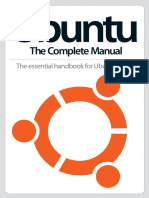0 ratings0% found this document useful (0 votes)
285 viewsNPM Commands - Cheatsheet
This document provides a cheat sheet of 50 common npm commands for initializing projects, installing packages, updating packages, removing packages, listing packages, viewing package information, running scripts, publishing packages, configuring npm, installing from Git repositories, handling global packages, and more. It covers the basic usage and purpose of key npm commands.
Uploaded by
adejuancCopyright
© © All Rights Reserved
Available Formats
Download as PDF, TXT or read online on Scribd
0 ratings0% found this document useful (0 votes)
285 viewsNPM Commands - Cheatsheet
This document provides a cheat sheet of 50 common npm commands for initializing projects, installing packages, updating packages, removing packages, listing packages, viewing package information, running scripts, publishing packages, configuring npm, installing from Git repositories, handling global packages, and more. It covers the basic usage and purpose of key npm commands.
Uploaded by
adejuancCopyright
© © All Rights Reserved
Available Formats
Download as PDF, TXT or read online on Scribd
You are on page 1/ 7
# [ npm Commands ] ( CheatSheet )
1. Getting Started
● npm init: Initialize a new Node.js project.
● npm init -y: Skip questionnaire and create a new Node.js project with
default settings.
2. Installing Packages
● npm install <package_name>: Install a package locally.
● npm install -g <package_name>: Install a package globally.
● npm install <package_name>@<version>: Install a specific version of a
package.
● npm install <package_name> --save: Install and add the package to the
project's dependencies.
● npm install <package_name> --save-dev: Install and add the package to the
project's dev dependencies.
3. Updating Packages
● npm update: Update all packages in your project.
● npm update <package_name>: Update a specific package.
● npm outdated: List outdated packages.
4. Removing Packages
● npm uninstall <package_name>: Remove a package from your project.
5. Listing Packages
● npm list: List installed packages.
● npm list -g --depth 0: List globally installed packages.
6. Package Information
● npm view <package_name>: View registry info for a package.
● npm view <package_name> versions: View all available versions of a
package.
By: Waleed Mousa
7. Running Scripts
● npm run <script_name>: Run a script defined in the package.json.
● npm start: Start a package.
● npm test: Run test scripts.
8. Publishing Packages
● npm publish: Publish a package.
● npm login: Log in to the npm registry.
● npm whoami: Display npm user name.
9. Miscellaneous Commands
● npm cache clean --force: Clean the npm cache.
● npm config list: List npm configuration.
● npm help <term>: Search for help on a term.
10. Troubleshooting
● npm doctor: Check your environment for common issues.
● npm rebuild: Rebuild a package.
11. Version Handling
● npm version major: Bump major version.
● npm version minor: Bump minor version.
● npm version patch: Bump patch version.
12. Exploring Packages
● npm explore <package_name> -- npm run <script>: Explore and optionally
run a script in a package.
13. Security
● npm audit: Audit your project for vulnerabilities.
● npm audit fix: Auto-fix vulnerabilities.
14. Linking Packages
By: Waleed Mousa
● npm link: Symlink a package folder.
● npm link <package_name>: Use a locally developed package in a local
install.
15. Configuring NPM
● npm set init-author-name 'Your Name': Set author name for npm init.
● npm config set registry <registry_url>: Set a custom registry.
16. NPM CI/CD
● npm ci: Clean install based on package-lock.json.
17. NPM Cache
● npm cache verify: Verify the contents of the cache.
18. Deprecating Packages
● npm deprecate <package_name> "<message>": Deprecate a package with a
message.
19. Peer Dependencies
● npm install <package_name> --save-peer: Add a package as a peer
dependency.
20. Optional Dependencies
● npm install <package_name> --save-optional: Add a package as an optional
dependency.
21. Package Lock
● npm shrinkwrap: Create an npm-shrinkwrap.json file.
22. NPM for Organizations
● npm access public <package_name>: Set package access to public.
● npm access restricted <package_name>: Set package access to restricted.
By: Waleed Mousa
23. Checking for Engine Compatibility
● npm engine-strict: Enforce engine compatibility.
24. NPM Funding
● npm fund: Display information about funding.
25. NPM Hooks
● npm hook add <url> <package_name>: Add a hook for a package.
26. NPM Orgs
● npm org create <orgname> <user>: Create an organization.
● npm team create <org:team> <user>: Create a team within an organization.
27. NPM Tokens
● npm token create: Create an authentication token.
● npm token list: List all tokens.
28. NPM Token Management
● npm token revoke <token>: Revoke a token.
29. Scoped Packages
● npm install @<scope>/<package_name>: Install a scoped package.
● npm publish --access=public: Publish a scoped package publicly.
30. Git Dependencies
● npm install <git-host>:<git-user>/<repo-name>: Install a package from a
git repository.
● npm install <github username>/<repository>#<branch>: Install directly
from a GitHub repository.
31. Handling Global Packages
By: Waleed Mousa
● npm ls -g --depth=0: List globally installed packages without
dependencies.
● npm root -g: Find the path of globally installed packages.
32. NPM Scripts and Custom Commands
● npm set-script <name> "<command>": Add custom scripts to your
package.json.
33. Environment Variables
● npm config set <key> <value>: Set an environment variable in npm.
● npm config get <key>: Get the value of an environment variable.
34. NPM Pack and Link
● npm pack: Pack a package into a .tgz file.
● npm link <package>: Link a local package to use it in another project.
35. NPM Diff
● npm diff: Compare the dependencies or versions.
36. NPM Dist Tags
● npm dist-tag add <package>@<version> [<tag>]: Add a tag to a package
version.
● npm dist-tag rm <package> <tag>: Remove a tag from a package.
37. NPM Search
● npm search <term>: Search for packages related to the term.
38. NPM Teams
● npm team add <team> <user>: Add a user to a team.
● npm team remove <team> <user>: Remove a user from a team.
39. NPM Version Management
● npm set version <version>: Force npm to use a specific version.
By: Waleed Mousa
● npm view <package_name> version: Check the latest version of a package.
40. NPM Registry Interaction
● npm ping: Check if you can communicate with the registry.
● npm whoami: Check the username logged in to the registry.
41. Package Restoration
● npm dedupe: Reduce duplication in the node_modules folder.
42. Handling Local Packages
● npm link: Create a symbolic link from a local package to node_modules.
● npm unlink <package>: Remove the symbolic link.
43. Shrinkwrapping
● npm shrinkwrap: Lock down the versions of a package's dependencies.
44. NPM Bugs and Support
● npm bugs <package>: Open the issues page for a package.
● npm support <package>: Open the support page for a package.
45. NPM Cache Control
● npm cache add <tarball file>: Add a package tarball to your cache.
46. NPM Networks and Proxies
● npm config set proxy <url>: Set a proxy for npm.
● npm config set https-proxy <url>: Set an HTTPS proxy for npm.
47. NPM and Docker
● npm prune: Remove extraneous packages.
48. NPM Package.json Fields
● npm pkg set <field>=<value>: Directly set a field in package.json.
By: Waleed Mousa
49. NPM Completion
● npm completion: Tab completion for npm commands.
50. NPM Registry Management
● npm set registry <url>: Change the registry URL.
By: Waleed Mousa
You might also like
- Extreme Privacy What It Takes To Disappear93% (15)Extreme Privacy What It Takes To Disappear514 pages
- How To Download Documents From Scribd For Free - 7 Methods67% (9)How To Download Documents From Scribd For Free - 7 Methods25 pages
- 250 Windows 10 11 Keyboard Shortcuts PDFNo ratings yet250 Windows 10 11 Keyboard Shortcuts PDF9 pages
- Extreme Privacy - Linux Devices (Michael Bazzell)No ratings yetExtreme Privacy - Linux Devices (Michael Bazzell)90 pages
- Top 800+ Latest Android Secret Codes - Hidden Codes 2019100% (10)Top 800+ Latest Android Secret Codes - Hidden Codes 201912 pages
- Extreme Privacy What It Takes To Disappear 4nbsped 8431566361 9798431566363No ratings yetExtreme Privacy What It Takes To Disappear 4nbsped 8431566361 9798431566363785 pages
- Michael Bazzell - Open Source Intelligence Techniques - Resources For Searching and Analyzing Online Information-Createspace Independent Publishing Platform (2021)100% (10)Michael Bazzell - Open Source Intelligence Techniques - Resources For Searching and Analyzing Online Information-Createspace Independent Publishing Platform (2021)669 pages
- Secret Code List For Android and All Samsung - Code Exercise100% (2)Secret Code List For Android and All Samsung - Code Exercise6 pages
- Trusting Digital Signature - Acrobat Reader 11 & AboveNo ratings yetTrusting Digital Signature - Acrobat Reader 11 & Above6 pages
- Restore Galaxy Null IMEI # and Fix Not Registered On NetworkNo ratings yetRestore Galaxy Null IMEI # and Fix Not Registered On Network36 pages
- McKinsey & Company - BU Strategic Plan Template Book - 2001No ratings yetMcKinsey & Company - BU Strategic Plan Template Book - 200158 pages
- Induction of General Anesthesia: Overview - UpToDate100% (1)Induction of General Anesthesia: Overview - UpToDate41 pages
- How To Cancel Your Premium Membership - Scribd Help Center17% (23)How To Cancel Your Premium Membership - Scribd Help Center1 page
- Node Package Manager Cheat Sheet: by ViaNo ratings yetNode Package Manager Cheat Sheet: by Via1 page
- 11 Free DevOps Certifications & Training Courses 2024No ratings yet11 Free DevOps Certifications & Training Courses 20247 pages
- Javascript Mobile Application Development: Chapter No. 1 "An Introduction To Apache Cordova"No ratings yetJavascript Mobile Application Development: Chapter No. 1 "An Introduction To Apache Cordova"29 pages
- Configuration and Deploy JFrog Artifactory in GCPNo ratings yetConfiguration and Deploy JFrog Artifactory in GCP2 pages
- Grafana Tutorial A Detailed Guide To Your First DashboardNo ratings yetGrafana Tutorial A Detailed Guide To Your First Dashboard1 page
- Puppet Cookbook - Third Edition - Sample Chapter0% (1)Puppet Cookbook - Third Edition - Sample Chapter44 pages
- Lab-4 (Jenkins and Maven Configuration)No ratings yetLab-4 (Jenkins and Maven Configuration)13 pages
- Custom Providers - NestJS - A Progressive Node - Js FrameworkNo ratings yetCustom Providers - NestJS - A Progressive Node - Js Framework10 pages
- Buy ebook Automated Software Testing with Cypress 1st Edition Narayanan Palani cheap price100% (9)Buy ebook Automated Software Testing with Cypress 1st Edition Narayanan Palani cheap price67 pages
- Deploying A Django Application To Elastic Beanstalk - AWS Elastic BeanstalkNo ratings yetDeploying A Django Application To Elastic Beanstalk - AWS Elastic Beanstalk12 pages
- Reed, Mark - Kubernetes - The Ultimate Beginners Guide To Effectively Learn Kubernetes Step-by-Step-Publishing Factory (2020)No ratings yetReed, Mark - Kubernetes - The Ultimate Beginners Guide To Effectively Learn Kubernetes Step-by-Step-Publishing Factory (2020)88 pages
- How To Add JWT-Based Authentication in NestJSNo ratings yetHow To Add JWT-Based Authentication in NestJS18 pages
- Deploying Web Apps in Enterprise ScenariosNo ratings yetDeploying Web Apps in Enterprise Scenarios269 pages
- Doctor-Patient-Webapp - Devops Professional-Capstone Proposal Document100% (1)Doctor-Patient-Webapp - Devops Professional-Capstone Proposal Document9 pages
- Python Tutorial - Deploy Model - SQL Machine Learning - Microsoft DocsNo ratings yetPython Tutorial - Deploy Model - SQL Machine Learning - Microsoft Docs8 pages
- C# - OOPS Inheritance - BestdotnettrainingNo ratings yetC# - OOPS Inheritance - Bestdotnettraining11 pages
- Spnego Single Sign-On Using Secure Login Server X.509 Client CertificatesNo ratings yetSpnego Single Sign-On Using Secure Login Server X.509 Client Certificates25 pages
- Python For The Busy Java Developer: The Language, Syntax, and EcosystemNo ratings yetPython For The Busy Java Developer: The Language, Syntax, and Ecosystem79 pages
- Download Full Azure Infrastructure as Code: With ARM templates and Bicep 1st Edition Henry Been PDF All Chapters100% (3)Download Full Azure Infrastructure as Code: With ARM templates and Bicep 1st Edition Henry Been PDF All Chapters40 pages
- Node - JS: Production Site ArchitectureNo ratings yetNode - JS: Production Site Architecture42 pages
- Java Plugin Creation Using Atlassian SDKNo ratings yetJava Plugin Creation Using Atlassian SDK5 pages
- Azure Kubernetes Service - Architecture & Implementation Case StudyNo ratings yetAzure Kubernetes Service - Architecture & Implementation Case Study9 pages
- Microservices, Container Docker and KubernetesNo ratings yetMicroservices, Container Docker and Kubernetes26 pages
- Same Same, But Better: Comparing Artifactory To Other Binary Repository ManagersNo ratings yetSame Same, But Better: Comparing Artifactory To Other Binary Repository Managers20 pages
- Essential Docker Commands 100 1696281691No ratings yetEssential Docker Commands 100 16962816915 pages
- Ultimate AWS Certified Cloud Practitioner’s Exam Guide: Master the Concepts, Services, Security, and Architectural Best Practices of AWS, EC2, S3, and RDS, and Crack AWS CLF-C02 Certification (English Edition)From EverandUltimate AWS Certified Cloud Practitioner’s Exam Guide: Master the Concepts, Services, Security, and Architectural Best Practices of AWS, EC2, S3, and RDS, and Crack AWS CLF-C02 Certification (English Edition)No ratings yet
- Free Prepper and Survival Manuals PDF SNo ratings yetFree Prepper and Survival Manuals PDF S19 pages
- LINUX Administrator's Quick Reference Card: User Management NFS File Sharing100% (3)LINUX Administrator's Quick Reference Card: User Management NFS File Sharing6 pages
- How To Get Verified Cash App Accounts - 2024 Safe and Secure...No ratings yetHow To Get Verified Cash App Accounts - 2024 Safe and Secure...6 pages
- Creating VBA Add-Ins To Extend and Automate Microsoft Office Documents100% (1)Creating VBA Add-Ins To Extend and Automate Microsoft Office Documents26 pages
- Product Recommendation Eaton Fuller Heavy-Duty Transmissions 13 - 18 Speed RT-6613No ratings yetProduct Recommendation Eaton Fuller Heavy-Duty Transmissions 13 - 18 Speed RT-66132 pages
- Lindsay Anton - The Final Paper - 2956488No ratings yetLindsay Anton - The Final Paper - 295648821 pages
- Jose Daniel G. Asuncion: 2FB Dapitan Regency Dapitan St. Sampaloc, Manila 20:00No ratings yetJose Daniel G. Asuncion: 2FB Dapitan Regency Dapitan St. Sampaloc, Manila 20:003 pages
- The Secret To Marketing Simulations by ConcentricNo ratings yetThe Secret To Marketing Simulations by Concentric41 pages
- 14 1 22 Engineering Datasheet Rse75n A13 RevcNo ratings yet14 1 22 Engineering Datasheet Rse75n A13 Revc1 page
- Orange and Violet Illustration Class Syllabus Education PresentationNo ratings yetOrange and Violet Illustration Class Syllabus Education Presentation5 pages
- IAC 16 - Regulatory Framework For Business TransactionsNo ratings yetIAC 16 - Regulatory Framework For Business Transactions13 pages
- Safety Data Sheet Sds #: Ninjaflex Semiflex: 1. Product and Company IdentificationNo ratings yetSafety Data Sheet Sds #: Ninjaflex Semiflex: 1. Product and Company Identification5 pages
- Cellulolytic Fruits Wastes: A Potential Support For Enzyme Assisted Protein ProductionNo ratings yetCellulolytic Fruits Wastes: A Potential Support For Enzyme Assisted Protein Production9 pages
- Enforcing Arbitration Awards in CaliforniaNo ratings yetEnforcing Arbitration Awards in California6 pages
- Practical Work in Geography Ch-6 Gis NewNo ratings yetPractical Work in Geography Ch-6 Gis New44 pages
- How To Download Documents From Scribd For Free - 7 MethodsHow To Download Documents From Scribd For Free - 7 Methods
- Top 800+ Latest Android Secret Codes - Hidden Codes 2019Top 800+ Latest Android Secret Codes - Hidden Codes 2019
- Extreme Privacy What It Takes To Disappear 4nbsped 8431566361 9798431566363Extreme Privacy What It Takes To Disappear 4nbsped 8431566361 9798431566363
- Michael Bazzell - Open Source Intelligence Techniques - Resources For Searching and Analyzing Online Information-Createspace Independent Publishing Platform (2021)Michael Bazzell - Open Source Intelligence Techniques - Resources For Searching and Analyzing Online Information-Createspace Independent Publishing Platform (2021)
- Secret Code List For Android and All Samsung - Code ExerciseSecret Code List For Android and All Samsung - Code Exercise
- Trusting Digital Signature - Acrobat Reader 11 & AboveTrusting Digital Signature - Acrobat Reader 11 & Above
- Restore Galaxy Null IMEI # and Fix Not Registered On NetworkRestore Galaxy Null IMEI # and Fix Not Registered On Network
- McKinsey & Company - BU Strategic Plan Template Book - 2001McKinsey & Company - BU Strategic Plan Template Book - 2001
- Induction of General Anesthesia: Overview - UpToDateInduction of General Anesthesia: Overview - UpToDate
- How To Cancel Your Premium Membership - Scribd Help CenterHow To Cancel Your Premium Membership - Scribd Help Center
- 11 Free DevOps Certifications & Training Courses 202411 Free DevOps Certifications & Training Courses 2024
- Javascript Mobile Application Development: Chapter No. 1 "An Introduction To Apache Cordova"Javascript Mobile Application Development: Chapter No. 1 "An Introduction To Apache Cordova"
- Grafana Tutorial A Detailed Guide To Your First DashboardGrafana Tutorial A Detailed Guide To Your First Dashboard
- Custom Providers - NestJS - A Progressive Node - Js FrameworkCustom Providers - NestJS - A Progressive Node - Js Framework
- Buy ebook Automated Software Testing with Cypress 1st Edition Narayanan Palani cheap priceBuy ebook Automated Software Testing with Cypress 1st Edition Narayanan Palani cheap price
- Deploying A Django Application To Elastic Beanstalk - AWS Elastic BeanstalkDeploying A Django Application To Elastic Beanstalk - AWS Elastic Beanstalk
- Reed, Mark - Kubernetes - The Ultimate Beginners Guide To Effectively Learn Kubernetes Step-by-Step-Publishing Factory (2020)Reed, Mark - Kubernetes - The Ultimate Beginners Guide To Effectively Learn Kubernetes Step-by-Step-Publishing Factory (2020)
- Doctor-Patient-Webapp - Devops Professional-Capstone Proposal DocumentDoctor-Patient-Webapp - Devops Professional-Capstone Proposal Document
- Python Tutorial - Deploy Model - SQL Machine Learning - Microsoft DocsPython Tutorial - Deploy Model - SQL Machine Learning - Microsoft Docs
- Spnego Single Sign-On Using Secure Login Server X.509 Client CertificatesSpnego Single Sign-On Using Secure Login Server X.509 Client Certificates
- Python For The Busy Java Developer: The Language, Syntax, and EcosystemPython For The Busy Java Developer: The Language, Syntax, and Ecosystem
- Download Full Azure Infrastructure as Code: With ARM templates and Bicep 1st Edition Henry Been PDF All ChaptersDownload Full Azure Infrastructure as Code: With ARM templates and Bicep 1st Edition Henry Been PDF All Chapters
- Azure Kubernetes Service - Architecture & Implementation Case StudyAzure Kubernetes Service - Architecture & Implementation Case Study
- Same Same, But Better: Comparing Artifactory To Other Binary Repository ManagersSame Same, But Better: Comparing Artifactory To Other Binary Repository Managers
- Ultimate AWS Certified Cloud Practitioner’s Exam Guide: Master the Concepts, Services, Security, and Architectural Best Practices of AWS, EC2, S3, and RDS, and Crack AWS CLF-C02 Certification (English Edition)From EverandUltimate AWS Certified Cloud Practitioner’s Exam Guide: Master the Concepts, Services, Security, and Architectural Best Practices of AWS, EC2, S3, and RDS, and Crack AWS CLF-C02 Certification (English Edition)
- LINUX Administrator's Quick Reference Card: User Management NFS File SharingLINUX Administrator's Quick Reference Card: User Management NFS File Sharing
- How To Get Verified Cash App Accounts - 2024 Safe and Secure...How To Get Verified Cash App Accounts - 2024 Safe and Secure...
- Creating VBA Add-Ins To Extend and Automate Microsoft Office DocumentsCreating VBA Add-Ins To Extend and Automate Microsoft Office Documents
- Product Recommendation Eaton Fuller Heavy-Duty Transmissions 13 - 18 Speed RT-6613Product Recommendation Eaton Fuller Heavy-Duty Transmissions 13 - 18 Speed RT-6613
- Jose Daniel G. Asuncion: 2FB Dapitan Regency Dapitan St. Sampaloc, Manila 20:00Jose Daniel G. Asuncion: 2FB Dapitan Regency Dapitan St. Sampaloc, Manila 20:00
- Orange and Violet Illustration Class Syllabus Education PresentationOrange and Violet Illustration Class Syllabus Education Presentation
- IAC 16 - Regulatory Framework For Business TransactionsIAC 16 - Regulatory Framework For Business Transactions
- Safety Data Sheet Sds #: Ninjaflex Semiflex: 1. Product and Company IdentificationSafety Data Sheet Sds #: Ninjaflex Semiflex: 1. Product and Company Identification
- Cellulolytic Fruits Wastes: A Potential Support For Enzyme Assisted Protein ProductionCellulolytic Fruits Wastes: A Potential Support For Enzyme Assisted Protein Production





